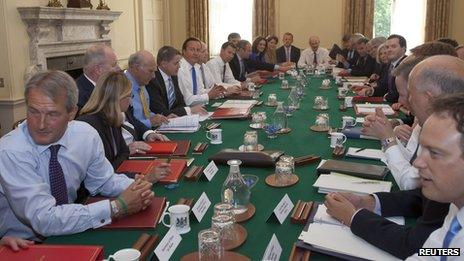Are annual cabinet reshuffles hope for the disaffected?
- Published
- comments

It is an entire seven days now since Cameron's shuffle.
Throughout Westminster new ministers are in back-to-back meetings. Civil servants are reading up on the various think pieces their new charges penned when free to speak their minds.
I understand the PM told new ministers as he appointed them - swigging claret or not - that they had hitherto written very interesting things about the world, and said very interesting things. Now had come the time to get on with it.
The word has also gone out not to follow the Anna Soubry model - that is, do an interview before your feet have hit the floor. Disappointing if you are a journalist; probably sensible if you want to make cabinet level.
For those passed over there is crushing disappointment.
Some in the 2010 intake believe that Cameron was nobbled by the 2005 intake - that last week's appointments whiff of having-done-time, of having been in parliament for a sobering amount of time. That may, however, just be generational pouting by the new MPs.
The key thing keeping many chins up in Westminster is word being put around by Andrew Mitchell, who runs the whips office, that from now on there will be an annual shuffle.
That is certainly the sense those not appointed this time round, have got.
The surprise oversights include Margot James and Harriet Baldwin. These two have accepted roles as parliamentary private secretaries (PPSs).
What interests me, apart from such a change in strategy from the prime minister, is that male MPs I have run this idea past - both new ministerial appointments and those left out - have pooh-poohed it.
This leads me to wonder whether this is something only being said to female MPs.
I wonder whether there will not be another reshuffle in a year's time designed specifically to bring on another round of women.
This would make sense if Cameron is to make good his pledge that government will be a third female by 2015.
By bringing so few women into junior government positions, the consensus is he has done little to solve his "conveyor belt problem" - namely that in order to promote someone to cabinet level you have to had made them a junior minister first.
This would be partially addressed if he shuffled his cards next year.
Alternatively, there will not be another reshuffle next year.
Instead, by putting around a suggestion that gives hope to the disaffected, the new whips office is already proving very, very effective.